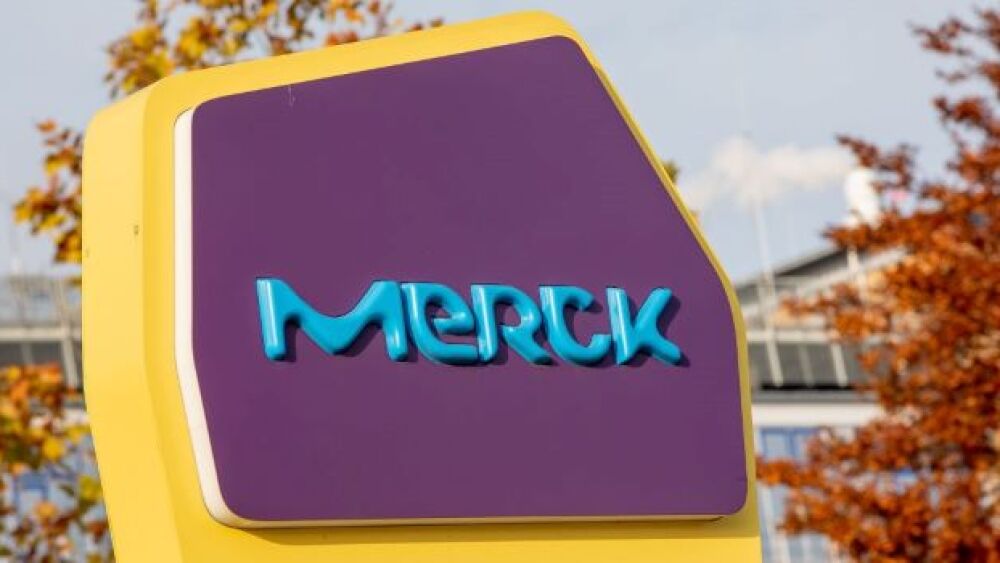Liver toxicities triggered a partial clinical hold on Merck KGaA’s trial studying its BTK inhibitor candidate for multiple sclerosis.
Pictured: Merck KGaA logo with Fall trees/TF-Images/Getty Images
The FDA has placed a partial clinical hold on Merck KGaA Darmstadt Germany’s Phase III EVOLUTION trial studying its investigational BTK inhibitor evobrutinib after two multiple sclerosis (MS) patients showed signs of liver injury, the company announced Wednesday.
The regulatory order disallows Merck from enrolling new patients into EVOLUTION and requires the German drugmaker to stop dosing in participants who had been treated with evobrutinib for fewer than 70 days.
Both patients were asymptomatic and did not require hospitalization or medical treatment, Merck reported. Liver enzyme levels normalized after stopping evobrutinib treatment.
EVOLUTION is fully enrolled with participants exposed to the study drug for over 70 days and as such, Merck does not expect the clinical hold to affect the study’s timeline. An initial readout is scheduled for the fourth quarter of 2023.
Still, the company’s shares dropped 7% on the Frankfurt Stock Exchange in reaction to the news. Merck is also working with the FDA to determine the best course for evobrutinib moving forward.
“Obviously, the partial hold is a challenge, but we believe that with a good dialogue with experts as well as with [the] FDA we will be able to address it,” Danny Bar-Zohar, global head of R&D and CMO at Merck, told BioSpace in an email.
EVOLUTION is being closely observed by an independent Data Monitoring Committee, which includes hepatologists. Together with other external experts, the committee and Merck are studying whether there are predisposing factors that could have contributed to the liver injury episodes.
“As always, efficacy is key,” Bar-Zohar said. “The Phase II data, as well as extension and bio markers make us confident in the benefit risk ratio for evobrutinib, and we await our Phase III data readout to make a compelling case for its therapeutic benefit for patients with relapsing multiple sclerosis.”
The Promise and Peril of BTK Inhibitors
Designed to penetrate the blood-brain barrier, evobrutinib is an oral candidate that belongs to a class of drugs called BTK inhibitors. These compounds target and deactivate the Bruton’s tyrosine kinase protein, which plays an important role in the maturation and development of B cells.
In MS, targeting the BTK protein could lower levels of autoantibodies that attack the protective sheath around nerves, leading to better disease outcomes.
The promise of BTK inhibitors in MS has attracted other biopharma companies, but safety issues have led to limited success in this space.
Last month, Biogen terminated its partnership with InnoCare Pharma and returned the investigational BTK inhibitor orelabrutinib to the Chinese collaborator. The two first signed their licensing agreement in July 2021 for a $125 million upfront payment from Biogen and the promise of up to $812.5 million more in commercial and developmental milestones.
In December 2022, InnoCare announced the FDA had placed orelabrutinib on partial clinical hold due to drug-related cases of liver injury.
Liver toxicity likewise tripped up Sanofi’s BTK inhibitor tolebrutinib and pushed the FDA to order a partial clinical hold on the candidate in June 2022. Sanofi licensed tolebrutinib from Principia Biopharma in 2017, and eventually bought the smaller biotech out in August 2020 for $3.68 billion.
Sanofi was also studying tolebrutinib in myasthenia gravis but dropped this program in February.
Tristan Manalac is an independent science writer based in metro Manila, Philippines. He can be reached at tristan@tristanmanalac.com or tristan.manalac@biospace.com






